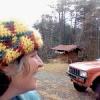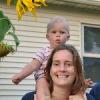 2013localsolutionsjudges 2013localsolutionsjudges Jul 2, 2013 06:52 |
Very nice proposal by an organization with proven track record. It grows an alternative economy that can reduce CO2.
Since this contest is focused on carbon reduction, could you specify how the winnings would be used to reduce carbon reduction through local food, low-cost housing, community engagement, and employment?
It seems like it would be difficult to measure impact. Do you have any plans for that (like the measures used by Transition Streets)?
|
 Russell Evans Jul 11, 2013 10:36 | Proposal contributor
Hey 2013localsolutionsjudges
We are stuck, and in the spirit of collaborative creation we have a couple of questions that may clarify some things for us:
To respond to your first suggestion, we can certain write about how growing food locally, reduces the distance it travels and therefore reduces CO2 emissions. (Especially if it is in people's front yards)
With the other categories of low-cost housing, community engagement, and employment we could also describe in a lot of detail how each has been implemented or will be implemented
With all of that said, the nature of our proposal is extremely radical in that at it's core, we are building a completely new kind of economy that by design just skips most activities which would create carbon. So with certain sections where we were given word limits, we chose to talk about that, rather than the specifics. To put it another way, our implementations are so broad and so diverse, that they are really hard to measure.
One thing that was curious was that when we were reading the other 39 proposals in the local solutions category, the thing we kept saying to ourselves is- "We should get these people to join Transition Lab. With our model, very few of them would need money to be implemented, because our models could support them."
So the best answer that I have to your question is to say- Our proposal could directly help support and empower nearly all of the other proposals in the local solutions category.
I know that this isn't a direct answer, but I figured that I would throw it out there and see what you thought.
Thanks
|
 2013localsolutionsjudges 2013localsolutionsjudges Jul 11, 2013 01:46 |
Thanks for checking in.
We realize that it's hard to measure CO2 reductions, especially with your broad proposal, but we do think that addressing measurement would make a stronger proposal, especially with MIT's focus on climate change. One way to do this would be to look at the carbon footprint of a typical household (for example, http://coolclimate.berkeley.edu/footprint) and note how your proposal would reduce various parts of the footprint. Even a little bit of discussion would go a long way.
We agree with your approach to budget. It is a very strong part of your proposal that influenced our evaluation.
|
 Russell Evans Jul 11, 2013 04:22 | Proposal contributor
Great- that's exactly the kind of feedback that we were looking for. It gives us a better direction of where to go from here. We'll have some changes up by tomorrow
|
 Pia Jensen Jul 11, 2013 06:48 |
would like to see how this may be replicated to achieve biggest bang for the buck!
Train the trainers
Collaboration across borders
Bigger classes/seminars
:)
|
 Pia Jensen Jul 11, 2013 06:18 |
in other words: go global - you'll need translators in the mix
|
 Russell Evans Jul 12, 2013 02:13 | Proposal contributor
Hey Judges (and others)-
We just rewrote the carbon emissions section of the proposal and would like some feedback on it. Do you feel that it answered your question?
Also PJ- the core of our model is training others so that they can replicate. We like your idea of train the trainers, etc- Do you feel that we need more of that in the proposal and if so where? I know that what is clear in my mind isn't always clear to others- so thanks for the feedback.
TL Team
|
 Pia Jensen Jul 12, 2013 02:18 |
I'd suggest:
In summary one clear sentence about "outreach" to potential orgs in identified other regions
In who will do the project one clear sentence about who those target orgs may be
In costs one line about cost of consultation (transport or use of online systems, materials, interpretive tools)
In timeline one clear sentence as to outreach time frame
:)
|
 2013localsolutionsjudges 2013localsolutionsjudges Jul 13, 2013 12:27 |
Looks great!
|
 Libby Blanchard Jul 15, 2013 04:24 |
I happened to stop by Transition Lab a few weeks ago and was so impressed to see what's happening on the ground with the organization. This is the kind of grassroots thinking that we need. Great proposal and excellent, real, on the ground action.
|
 Russell Evans Jul 15, 2013 07:48 | Proposal contributor
Hey PJ-
We just added a bunch of stuff based on your suggestions. Muchisimas gracias.
It's mostly in the Who will take these actions, and in timeline.
Thanks again-
Russell and Jake
|
 Pia Jensen Jul 20, 2013 03:19 |
Claro! Muy bueno. Looks great!
|
 2013localsolutionsjudges 2013localsolutionsjudges Jul 29, 2013 03:41 |
The low budget with alternative economy increases this proposal's feasibility and ability to be replicated in other cities.
|
 Libby Blanchard Aug 1, 2013 01:21 |
A solid proposal with leveraged efficiency.
|
 Marvie M. Aug 12, 2013 04:15 |
I would like to learn more about transition lab, so that I can introduce the proposal to the local neighborhood.
|
 Russell Evans Aug 12, 2013 10:52 | Proposal contributor
Hey Marvie-
Thanks for commenting and voting. There are a couple things that you can do to learn more about what we are up to: The first is to visit our website at www.transition-lab.com, and for the most recent updates, visit our blog on the website. The proposal, while lengthy- does explain what we are doing and how we are doing it, and feel free to try to bring these ideas to life in your community in ways that you see fit.
What we would really like to see happen is for folks to be able to come and participate as Skilled Residents so that they can take our models back to their communities for replication. While this is not possible for everybody, we have some basic outlines for these models at www.transition-lab.com/models .
So I hope that helps and if you need anything else, feel free to contact us.
Russell & Jake.
|
 Karen Nasmith Aug 16, 2013 09:03 |
Hi Russell and Jake and the Transition Lab. Thanks for your great message. In short, we'd love to collaborate with you! You are right - what you are doing would significantly benefit any grassroots social innovation type movement - or any community-based initiative for that matter. We chose to work with well established neighbourhoods groups in our initial pilot, but even these groups would welcome passionate, energetic folks looking to learn new skills and make a difference. Your model is wonderful and we wish you the best of luck. In terms of a collaboration, we're currently collaborating with the local Transition Guelph movement. Like you, they've made significant accomplishments in fostering a non-traditional economy by establishing a time bank and supporting similar work for rent exchanges in the community. We'd love to explore a collaboration with you that is rooted in this system - perhaps bartering some of the lessons we've learned from Project Neutral in return for web-based Transition Lab training for a few of our volunteers (that way we avoid the significant carbon emissions from flying).
Glad that our paths have crossed and looking forward to exploring this further.
Karen
|
 Ryan Pleune Aug 22, 2013 12:47 |
Amazing work - I am very grateful to all involved!!!!
|
 Joshua Brancheau Aug 23, 2013 08:31 |
This is by far the most comprehensive approach to carbon emission reduction. Change everything. The system we have grown up through the last many decades was predicated on maximizing profits through the presentation of an unlimited wellspring of resources that were readily available (meanwhile masking the true cost to the planet of these resources). As people become more aware that this is just not the truth the system will need to change... How do we change? Transition Labs has presented a solid approach to re-imagine the exchange of resources that promotes the locality of material wealth as well as the innate ability of every human community to provide for themselves, at a discount, what the corporate oligarchy would like to sell to you at a triple mark-up. How do we change??... Transition Lab!!
|
